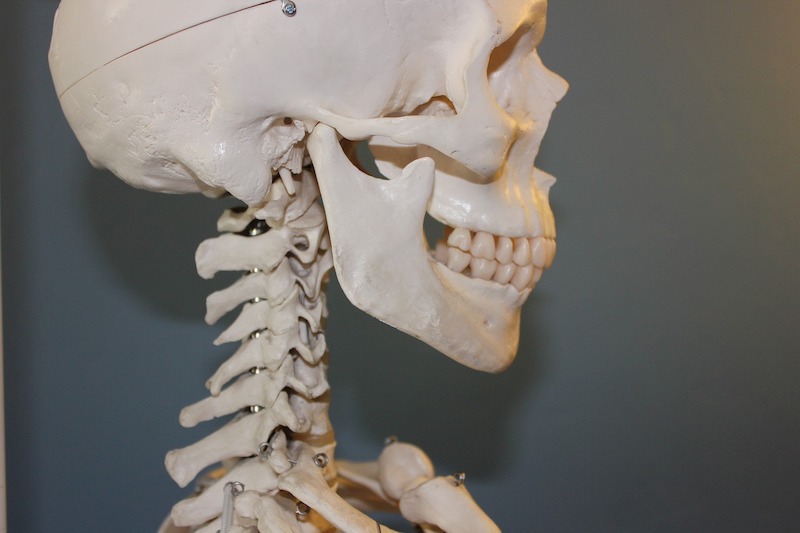
Suffering from unexplained jaw or facial pain?
A patient recently came into our Towson dentist office in a similar position. They were convinced they must have a bad tooth — how else could their tight jaw, headaches, and facial pain be explained?
A gentle examination confirmed what we expected. While the patient’s teeth were in perfect health, their jaw joints (called the temporomandibular joint or TMJ) were not working properly.
Here's what we told this person and what might be going on in your mouth, too.
What are temporomandibular joints (TMJ)?

The temporomandibular joints (TMJ) are located at the base of your skull in front of your ear on both sides, and connect the lower jaw to the upper jaw.
Working in conjunction with your muscles, bones, ligaments, and discs, these joints allow for the rotating and gliding actions of your mouth.
Think of your TMJ is as a door hinge, allowing your mouth to open and close smoothly. When working properly, you won’t even notice your TMJ.
Unfortunately, the TMJ can be a little finicky. These joints can become easily inflamed, injured, or poorly positioned, leading to a disruption in its normally smooth motion. The result is TMJ disorder (sometimes called TMD).
TMJ disorder by the number:
• 10 million — The number of Americans who suffer from TMJ disorder
• 20-40 — The age range when TMJ disorder typically develops
• 3x — The likelihood that women will suffer from TMJ pain more than men
What causes TMJ disorder

Can you guess the biggest cause of TMJ issues?
Like we mentioned, TMJ problems develop when there’s a disruption in your jaw’s motion. Surprisingly, the biggest disruption happens when your body experiences physical, mental, and emotional strain or tension.
That’s right, STRESS is the primary cause of TMJ pain.
You’ve probably already seen how stress can manifest itself physically in your life. But unlike any other joints in your body, the temporomandibular joint is the only one that can register stress.
Other causes of TMJ include:
• Clenching and grinding your teeth — Many people grind their teeth at night or keep their jaw clenched during the day without even realizing it. This can cause tense jaw muscles and spur TMJ pain.
• Medical issues — Dislocation of the disc between the ball and socket of your joint or erosion of your tissue can lead to TMJ issues. Osteoarthritis or rheumatoid arthritis in the TMJ can also be a cause.
• A jaw, neck, or head injury — Accidents, sports injuries, or traumatic injuries can damage the bone, muscle, or cartilage around the TMJ joint.
• A misaligned bite — Your joint may become misaligned or thrown out of place. The muscles surrounding the jaw may also be overworked because of missing teeth or a crooked smile.
• Other lifestyle factors — Beyond stress, things like poor posture and too much gum chewing may lead to pain in your TMJ.
How TMJ hurts your health
Left undiagnosed and unresolved, TMJ can have devastating lifestyle, dental, and overall health effects. Over time, you may start to experience:
• Issues with your bite
• Wear and tear on your teeth, jaw, and gums
• Damage to previous dental work like crowns, fillings, and implants
• Lack of sleep
• Chronic headaches
• Hearing problems
• Eating disorders
Although there’s a high chance you’ll develop at least some level of TMJ in your lifetime, there are a few things you can do to help prevent it from developing. Since stress is the number one cause, your first line of defense should be to focus on staying relaxed!
Here are a few techniques to try:
• Yoga, deep breathing, meditation, soaking, massages, and other relaxation activities.
• Learn to recognize when you're clenching your teeth. Keep your teeth apart when not eating.
• Give your mouth a break. Avoid constant chewing on gum, biting your nails, or holding a telephone between your shoulder and jaw. And avoid too many hard or sticky foods.
• Watch your posture and avoid slumping, slouching, or "hanging on your hinges."
Signs of TMJ disorder

TMJ issues usually manifest as jaw pain. But there are other symptoms you should be aware of:
• A popping or clicking noise when you open, close, and move your mouth
• Frequent headaches
• Stiff muscles in your face, neck, and back
• Blurry vision and dizziness
• Tightness in your jaw, even when you’re not eating or speaking
• Trouble sleeping or a painful jaw when you wake up
How to diagnose TMJ issues
So how do you know for sure that TMJ disorder is what you’re suffering from and not something else?
Diagnosing TMJ is a little bit tricky. There’s no universally accepted, standard test to correctly identify the issue. Plus other dental issues like a toothache or even a sinus issue can cause similar issues.
However, telling your dentist about your symptoms combined with a gently physical examination of your face and jaw can usually provide enough useful information for a diagnosis. If necessary, your dentist may also use x-rays of the TMJ or make a cast of your teeth to better visualize how your bite fits together.
TMJ disorder treatments
To treat TMJ pain, the first thing your dentist will recommend is to practice relaxation techniques and self massage.
Like we mentioned, you’ll need to focus on not clenching your teeth or jaw. We’ve also found that taking some time every morning and evening to massage your jaw can help loosen and relax your muscles.
But these simple techniques aren’t always enough. If that’s the case, several options may be recommended:
• Occlusal Equilibration: This gentle procedure adjusts your mouth so the lower and upper teeth meet evenly all the way around.
• Orthodontic Treatment: Braces or invisible aligners can often be used to align your teeth and properly position your TMJ.
• Physical Therapy: Your dentist may refer you to a licensed physical therapist to help restore your bite and ease pain. Physical therapy for TMJ generally involves relaxation, stretching, and releasing tight muscles and scar tissue.
• Night Guard: A night guard or NTI (custom device) are the most common forms of TMJ treatment. The night guard fits in your mouth like a retainer while the NTI fits on the front teeth to prevent the back teeth from unknowingly grinding at night.
• Acupuncture: Some have found acupuncture therapy to be useful in treating TMJ pain.
Talk to us about your TMJ pain

Suffering from jaw pain or any of the other TMJ symptoms mentioned in this article? Try some relaxation techniques and mouth stretches to see if it helps! You should also talk to your dentist about what you’re going through.
Our team is here to help. Schedule a consultation today and we’ll help diagnose your pain and offer the best treatment plan for your situation and symptoms.